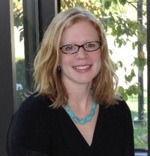Grad student Jennifer Conrad sees the beast in us all
While many people may not see themselves reflected when they look into the eyes of a dog or cat, when Jennifer Conrad sees an animal, she sees its connection to humanity.
Conrad, a graduate student in the University of Wisconsin–Madison Literary Studies English Ph.D. program, was co-curator of an art exhibit in January exploring the connection of animals and humans at the Madison Public Library, entitled “The Beast in Me.”

Conrad
Pieces at the exhibit included a variety of animal-human themes, from half-human, half-leopard woman to a man holding a cat to two wolves drowning.
The unusual nature of the artwork mirrors Conrad’s work to discover the deeper meaning of the human relationship to animals.
“I’m interested in looking at spots where the boundaries between human and animal become a little blurry and merge in literature and art, especially spots that are a little bit disturbing and make us see ourselves and how we relate to non-human others a little bit differently,” Conrad says.
In the curator’s statement for “The Beast in Me,” she said: “Yet looking at animals, whether real or represented, may help us to see ourselves and our surroundings more clearly. Through animals, we glimpse a different way of being in the world. We begin to see, by way of their familiar shapes and gazes, something strange and new.”
Conrad splits her time between advising College of Letters and Science honors students and exploring the link between humans and animals in literature and art.
After completing her Master of Fine Arts degree in creative writing at American University, Conrad took a six-year break from academia and worked for the Journal of East Asian Linguistics at Harvard University where she worked with people from different parts of the world.
Conrad also spent three years living in the Hudson Valley where she worked at Olana, the historic home of painter Frederic Church. When she decided to go back for her Ph.D., she and her husband looked for a city that would make a good home for a poet and an artist, and decided on Madison.
Conrad’s husband, Trent Miller, has a piece in “Time (Im)material,” the show running at Union South through Nov 30.
Before coming back to work on her Ph.D., Conrad was writing poetry under the name J. L. Conrad and published her first book of poetry, “A Cartography of Birds,” in 2002. She is currently working to publish her second book, “Disaster Fruit.”
Although she has begun exploring fiction and visual art, her focus as a writer has long been in poetry, because, as she jokes, “I have no sense of plot, so that keeps me from fiction.”
The openness of poetry is what initially drew her to the medium, she says.
“I like the freedom language can provide. I like the chances to use it as material. In poetry you can manipulate words the way you would manipulate paint on a canvas. It’s not just content but the way it is said,” she adds.
Conrad focuses most of her dissertation reading on animal-human interactions in writing.
She’s found while there is a whole genre devoted to road kill, not many writers focus on meat as subject matter. Her first dissertation chapter explores the materiality of bodies as they appear in literature and art as well as the ways this materiality can potentially open up new ways of relating to non-human others.
Conrad says her dissertation makes her look for different things as a reader and writer, such as moments when there’s an unusual description of an animal.
“When I was writing about animals in poems, people would come up to me and they would have these memories of animal poems. I think it’s something people really connect with,” Conrad says. “It’s obvious, right, we have relationships with animals, we have pets, but in other ways, what does that mean? We don’t always make the connection of what it could mean.”
As Conrad works to explore the meaning of that connection during the sixth year of her doctoral program, she keeps herself busy with multiple academic and professional commitments.
In addition to her honors L&S advising, she works at the Writing Center, is a member of CHE, an organization for graduate students interested in studying the environment, and is also working on her next book of poetry.
Conrad is organized the A.W. Mellon workshop in Animal Studies, which will had its first event earlier this month — a one-day colloquium at the Pyle Center on the “Disciplines of Animal Studies.”
She is also co-curator of FELIX, a series that works to bring new and exciting voices in poetry to do readings in Madison while also supporting small and independent presses.
Completing her dissertation while also advising students requires hard work and focus and Conrad recognizes the challenge: “At the best of times it’s inspiring, but it’s also work,” she says.
Tags: arts, College of Letters & Science
